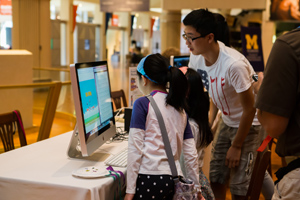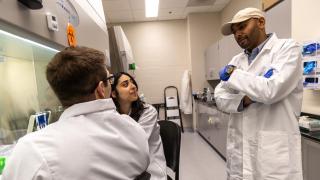

Emily Lerner knows the stereotype: Engineers are studious, serious and analytical.
Yes, she could be described that way. But now she’s on a mission to introduce another side of engineering to the next generation of students.
“The creative side of engineering takes a back seat too often,” said Lerner, a University of Michigan-Dearborn electrical engineering student. “Engineers should always be thinking of cool, fun things to do with their knowledge.”
Cue the College of Engineering and Computer Sciences’ (CECS) sound workshop, which introduces children and youth to music technology. The college ran the workshop this summer as part of The Henry Ford’s “Tinker. Hack. Invent.” series.
Kids took a shot at becoming recording artists, working with GarageBand to record keyboard arrangements and loop tracks. Others learned to code using the Scratch programming environment, which allows students to work graphically with programming concepts and create animations complete with sound.
“The technology behind this is pretty cool. Your computer becomes your musical instrument and you’re creating sounds by writing algorithms,” said Paul Watta, associate professor of electrical and computer engineering. “We were trying to show that they can use computer technology to create something cool and do something that has artistic components too.”
Six CECS students and one recent grad led the workshops. Lerner says the day was an opportunity to connect participants to the math and science behind the fun and games.
“You get to see the light bulbs above their heads when they connect material things with digital logic,” Lerner said. “Teaching kids that numbers are tools we use to measure the world and describe it is the best part about being a teacher.”
Watta plans to parlay student interest in sound engineering into the development of an undergraduate computer music course next semester. The course will be open to students across majors and colleges in an effort to promote collaboration and break down barriers between disciplines.
“In industry, you’re always working on multidisciplinary teams—backend people, marketing people, designers,” Watta said. “There are a lot of different factors you have to consider and working on multidisciplinary teams as an undergraduate will help prepare them for life in industry.”



